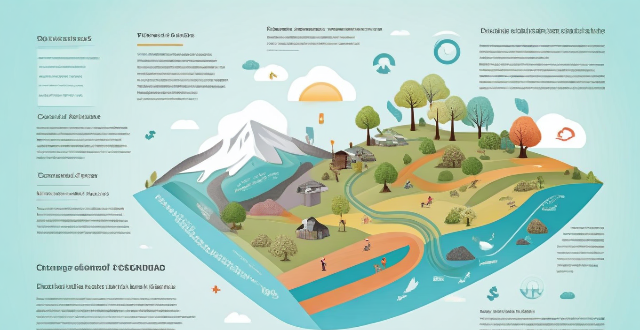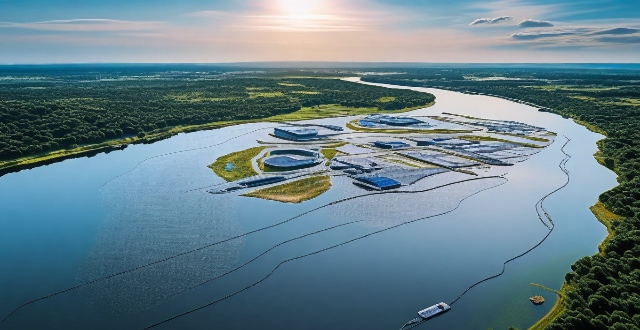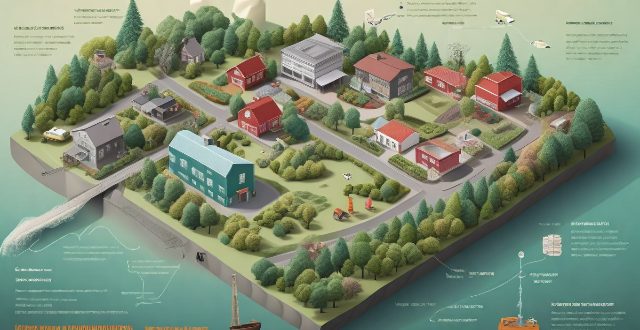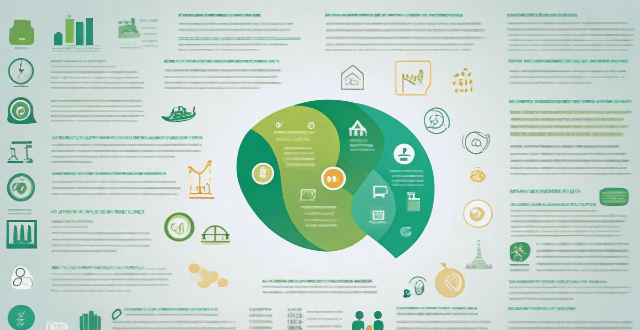Nie Change

Can ESG principles help mitigate climate change ?
ESG principles, which stand for Environmental, SocialESG principles, which stand for Environmental, Social, have become increasingly important in These principles aim to encourage companies to operate in a more sustainable and socially responsible manner. In this context, it is worth exploring whether these principles can help mitigate climate change. The environmental aspect of ESG focuses on reducing the negative impact of business operations on the environment. This includes reducing greenhouse gas emissions, conserving natural resources, and minimizing waste generation. By promoting these practices, ESG principles can contribute to mitigating climate change in several ways: * Reducing Carbon Emissions: Companies that prioritize environmental sustainability are likely to reduce their carbon footprint by using renewable energy sources, improving energy efficiency, and investing in low-carbon technologies. This can help lower global greenhouse gas emissions, which are a major driver of climate change. * Conserving Natural Resources: By promoting sustainable resource management, ESG principles can help reduce deforestation, protect biodiversity, and conserve water resources. These actions can help maintain the health of ecosystems that play a crucial role in regulating the Earth's climate. * Minimizing Waste Generation: Encouraging companies to adopt circular economy models and reduce waste generation can help reduce the amount of greenhouse gases produced during waste disposal processes. Additionally, recycling and reusing materials can help conserve natural resources and reduce the need for new raw material extraction, further contributing to climate change mitigation. The social aspect of ESG focuses on promoting fair labor practices, human rights, and community involvement. While these principles may not directly address climate change, they can indirectly contribute to mitigating its effects by fostering a sense of corporate responsibility and encouraging companies to invest in their communities. This can lead to increased awareness and action around climate change issues, as well as support for policies and initiatives aimed at addressing the problem. The governance aspect of ESG emphasizes transparency, accountability, and ethical behavior within a company's management structure. By promoting good governance practices, ESG principles can help ensure that companies are held accountable for their environmental impact and are more likely to adopt sustainable business strategies. This can lead to increased transparency around carbon emissions reporting, better alignment between corporate goals and climate objectives, and improved stakeholder engagement on climate-related issues. In conclusion, ESG principles can certainly help mitigate climate change by promoting environmentally sustainable business practices, fostering a sense of corporate responsibility, and ensuring transparency and accountability within companies' management structures. However, it is important to note that these principles alone may not be sufficient to fully address the complex challenges posed by climate change. A comprehensive approach involving government policies, international cooperation, and individual actions will also be necessary to achieve meaningful progress in mitigating the effects of climate change.

How might climate change affect long-term investment returns and what should investors do about it ?
Climate change is a global phenomenon that has the potential to significantly impact long-term investment returns. Here are some ways in which climate change could affect investments: 1. Impact on Asset Prices: Climate change can affect the prices of various assets, including stocks, bonds, and real estate. For example, companies that rely heavily on fossil fuels or are located in areas vulnerable to climate-related risks may see their stock prices decline. On the other hand, companies that focus on renewable energy or have strong sustainability practices may see their stock prices increase. 2. Changes in Industry Landscape: Climate change can also lead to shifts in the industry landscape. Industries that are heavily reliant on natural resources, such as agriculture and fishing, may be negatively impacted by climate change. Conversely, industries that focus on sustainability and renewable energy may experience growth. 3. Regulatory Risks: Governments around the world are implementing policies to combat climate change, which could impact certain industries. For example, regulations aimed at reducing carbon emissions could negatively impact companies in the fossil fuel industry. Investors need to be aware of these regulatory risks and how they might impact their investments. 4. Physical Risks: Climate change can also pose physical risks to investments. For example, extreme weather events like hurricanes and floods can damage property and infrastructure, affecting the value of real estate investments. Similarly, droughts and other climate-related events can impact agricultural yields, affecting the profitability of farming-related investments. Given the potential impact of climate change on investments, investors should take steps to mitigate these risks. Here are some strategies that investors can consider: 1. Diversify Your Portfolio: Diversification is always a smart strategy when it comes to investing, and this holds true when considering the impact of climate change. By diversifying your portfolio across different asset classes and industries, you can reduce your exposure to any one sector that might be negatively impacted by climate change. 2. Invest in Sustainable Companies: Investing in companies that prioritize sustainability and have strong environmental practices can help mitigate the risks associated with climate change. These companies are often better positioned to adapt to changing market conditions and may even benefit from shifts towards more sustainable practices. 3. Consider Impact Investing: Impact investing involves investing in companies or funds that have a positive social or environmental impact, in addition to financial returns. This can be a good way to align your investments with your values and support sustainable businesses that are working to address climate change. 4. Stay Informed About Climate Risks: Finally, it's important for investors to stay informed about the potential risks that climate change poses to their investments. This includes staying up-to-date on government policies related to climate change and monitoring how these policies might impact different industries and asset classes.

How does climate change affect education ?
Climate change impacts education through extreme weather events, health issues, food insecurity, economic challenges, social changes, and environmental degradation. These effects necessitate collaboration between educators and policymakers to develop resilient strategies for adapting to climate change.

How does climate change legislation influence corporate sustainability practices ?
Climate change legislation significantly influences corporate sustainability practices by setting standards for environmental responsibility. It compels companies to report on their environmental impact, use market-based mechanisms like cap-and-trade systems, and consider tax incentives or penalties in their operations. This legislation also creates investor pressure through ESG criteria and shareholder resolutions, leading companies to enhance their sustainability practices to meet investor expectations. Additionally, it opens market opportunities for green products and services and encourages renewable energy adoption. Companies that comply with climate legislation can improve their brand image and stakeholder engagement. Furthermore, such legislation aids in risk management by requiring companies to assess physical and transition risks associated with climate change. Overall, climate change legislation is a driving force behind corporations adopting more sustainable practices.

How is climate change affecting global temperatures ?
Climate change, largely due to human activities like burning fossil fuels and deforestation, is causing a rise in global temperatures. This has led to more frequent and severe extreme weather events, melting ice caps, ocean warming and acidification, changes in precipitation patterns, impacts on biodiversity, and challenges for agriculture. The situation calls for immediate action to reduce greenhouse gas emissions and adapt to the changing climate.

How does climate change impact national security ?
Climate change impacts national security in various ways, including economic disruption, social unrest, and political instability. To mitigate these effects, it is essential to take action at both the national and international levels, such as reducing greenhouse gas emissions, investing in renewable energy sources, and adapting to the inevitable changes brought about by climate change.

What role do fossil fuel companies play in climate change denial ?
Fossil fuel companies contribute to climate change denial through financial interests, lobbying, and disseminating misinformation. They fund think tanks, engage in advertising campaigns, and influence politics to protect their profits and shape public opinion against strict environmental regulations. This resistance hinders effective action on climate change.

How is climate change affecting the insurance industry ?
Climate change is significantly impacting the insurance industry by increasing natural disasters, altering liability exposures, and prompting regulatory changes. Insurers must adapt to these challenges by updating risk assessment models, complying with new regulations, shifting investment portfolios towards sustainability, and innovating products. This adaptation is crucial for insurers' financial resilience and their role in aiding societal adaptation to climate change.

What are the potential risks of climate change for the insurance sector ?
Climate change poses significant threats to the insurance sector, including increased natural disasters, changes in liability exposures, property value fluctuations, and regulatory/legal changes. Insurers must adapt by assessing risks, updating policies, and collaborating with governments to create effective strategies.

How does climate change impact social justice ?
Climate change has significant impacts on social justice, affecting marginalized communities, health outcomes, economic stability, migration patterns, and gender equality. Mitigation efforts to reduce greenhouse gas emissions and adaptation strategies to build resilience against the impacts of climate change are necessary to create a more equitable future for all.

What are the impacts of climate change on human health ?
Climate change affects human health in various ways, including increased heat-related illnesses, extreme weather events, changes in disease patterns, food and water security issues, and mental health impacts. It is important to take action to mitigate these effects and protect public health.

How can education help combat climate change ?
Education is a powerful tool in the fight against climate change by fostering awareness, promoting sustainable practices, stimulating innovation, and shaping policy. It empowers individuals to make informed decisions and advocate for environmental protection through comprehensive science education, applied learning experiences, interdisciplinary research, and civic engagement. By integrating sustainability into curricula and encouraging global perspectives, education prepares future generations to tackle the complex challenges of climate change effectively.

How does climate change affect consumer behavior ?
Climate change is affecting consumer behavior by increasing environmental awareness, changing shopping habits, driving a shift towards green energy, promoting sustainable food choices, and inspiring advocacy and activism. As consumers become more conscious of their impact on the environment, they are making changes in their purchasing habits to reduce their carbon footprint. Businesses that prioritize sustainability will be better positioned to succeed as consumers continue to make eco-friendly choices.

How effective has the United Nations Framework Convention on Climate Change (UNFCCC) been in addressing global climate change ?
The United Nations Framework Convention on Climate Change (UNFCCC) is a global treaty adopted in 1992 to stabilize greenhouse gas concentrations and prevent dangerous interference with the climate system. While it has achieved some successes, such as promoting international cooperation and establishing mechanisms for climate finance and technology transfer, its effectiveness has been limited by factors like lack of compliance and political will. To make a significant impact on global climate change, stronger commitment and concrete actions from all parties involved are necessary.

How does climate change affect water resources and availability ?
Climate change affects water resources and availability through melting glaciers, changes in precipitation patterns, sea level rise, increased evaporation rates, and impacts on ecosystems. These impacts can lead to water scarcity, flooding, contamination of freshwater sources, and declines in biodiversity. To mitigate these effects, it is important to reduce greenhouse gas emissions and implement adaptation strategies such as improved water management and conservation measures.

How do investors evaluate a company's CSR performance related to climate change when making investment decisions ?
When making investment decisions, investors consider a company'When making investment decisions, investors consider a company' Responsibility (C investors consider a company's Corporate Social Responsibility (CSR) performance related to climate change. The article discusses how investors evaluate a company's CSR performance related to climate change when making investment decisions. The first step in evaluating a company's CSR performance related to climate change is to assess its environmental impact. Investors look at the company's carbon footprint, energy consumption, waste management practices, and other environmental metrics to determine its impact on the environment. Companies with lower carbon emissions and better waste management practices are considered more sustainable and attractive to investors. Investors also evaluate a company's sustainability reporting practices. Companies that provide detailed reports on their environmental impact, social responsibility initiatives, and governance practices are seen as more transparent and accountable. Another important factor that investors consider is a company's use of renewable energy sources. Companies that rely heavily on fossil fuels for their operations are considered less sustainable than those that use renewable energy sources such as solar or wind power. Carbon offsetting programs are another way that companies can demonstrate their commitment to reducing their carbon footprint. Finally, investors evaluate a company's stakeholder engagement practices related to climate change.

What is the impact of climate change on the global economy ?
Climate change affects the global economy in various ways, including reduced crop yields, water scarcity, forest fires, changes in energy production, human health issues, displacement and migration, and insurance and financial risks. Addressing climate change is crucial for both environmental and economic reasons.

How can climate resilience help mitigate the impacts of climate change ?
Climate resilience is a crucial strategy for mitigating the effects of climate change. It involves reducing vulnerability, enhancing adaptive capacity, promoting sustainable development practices, and fostering social cohesion. By implementing these strategies, communities can become more resilient and better able to cope with the impacts of climate change.

In what ways does climate change exacerbate existing food insecurity issues ?
Climate change exacerbates food insecurity by causing unpredictable weather, altering crop yields, increasing pest and disease outbreaks, contributing to biodiversity loss, and impacting fisheries. Addressing these challenges requires a comprehensive approach that includes adaptation strategies, sustainable agriculture practices, and efforts to mitigate the effects of climate change.

What are the key provisions of the latest climate change legislation ?
The latest climate change legislation is a comprehensive package of measures aimed at addressing the challenges posed by global warming and climate change. The key provisions include reduction of greenhouse gas emissions, adaptation to climate change impacts, international cooperation and leadership, just transition for workers and communities, and transparency and accountability.

Can climate change cause extinction of certain species ?
Climate change has the potential to cause the extinction of certain species through a variety of mechanisms including rising temperatures, changes in precipitation patterns, loss of habitat, and disruption of food webs. It is essential that we take action to mitigate the effects of climate change and protect vulnerable species before it's too late.

What are the effects of climate change on biodiversity and ecosystems ?
Climate change has significant effects on biodiversity and ecosystems, including habitat loss, changes in species distribution, altered ecosystem functioning, extinction risk, and impacts on human well-being.

What is the relationship between climate change and poverty ?
This article examines the complex relationship between climate change and poverty, explaining how each exacerbates the other. It outlines the impact of climate change on poverty through increased natural disasters, loss of livelihoods, and health risks. Conversely, it also explores how poverty contributes to climate change through deforestation, energy poverty, and lack of resources for climate action. The article concludes by emphasizing the need for urgent attention from policymakers and individuals to address both issues simultaneously, aiming for a more equitable and sustainable future.

How will climate change influence future job markets ?
The article discusses how climate change will influence future job markets. It highlights the increased demand for green jobs, a shift toward resilient industries, and potential declines in certain sectors that contribute to greenhouse gas emissions or rely heavily on fossil fuels. Additionally, remote work opportunities may rise due to extreme weather events and environmental concerns. The article concludes by emphasizing the need for individuals and organizations to adapt to these changes in the job market.

How do climate summits contribute to global efforts to combat climate change ?
Climate summits play a crucial role in the global fight against climate change by setting targets and goals, encouraging international cooperation, promoting policy and technological innovation, raising awareness and mobilizing action, and financing climate action.

What are the potential consequences of climate change for forest-dependent communities ?
The article discusses the potential consequences of climate change for forest-dependent communities, including loss of habitat and alteration of ecosystems leading to reduced access to resources, changes in precipitation patterns affecting water availability, and impacts on agriculture and food security due to changes in crop yields and increased pests and diseases. Addressing these challenges requires a comprehensive approach that involves both adaptation strategies and efforts to mitigate the effects of climate change.

What role do children play in combating climate change ?
The article emphasizes the pivotal role children can play in combating climate change. They can contribute through education and awareness, innovation and creativity, advocacy and action, and by making sustainable lifestyle changes. By empowering children to understand and act on climate issues, we can ensure a more sustainable future for all.

How does climate change affect global supply chain management ?
Climate change affects various aspects of life, including global supply chain management. Extreme weather events, rising sea levels, changes in agricultural production, energy costs, and labor availability are some ways in which climate change impacts this crucial aspect of business operations. Businesses must adapt their strategies to mitigate these risks and ensure the continued efficiency and effectiveness of their operations.

How do scientists study climate change ?
Scientists study climate change through observational data, modeling, and field research. They use satellites, weather stations, ocean floats, climate models, paleoclimate reconstructions, ice cores, coral reefs, tree rings, and interdisciplinary collaboration to collect and analyze data. They also publish synthesis reports like the IPCC Assessment Reports to summarize current scientific knowledge on climate change.

How can we use climate predictions to mitigate the effects of climate change ?
Climate predictions are vital in mitigating climate change impacts. They help in adaptation planning, guiding mitigation strategies, informing policy development, raising awareness, and driving research and innovation. By understanding future climate conditions, we can take proactive measures to reduce the effects of climate change on our environment and society.